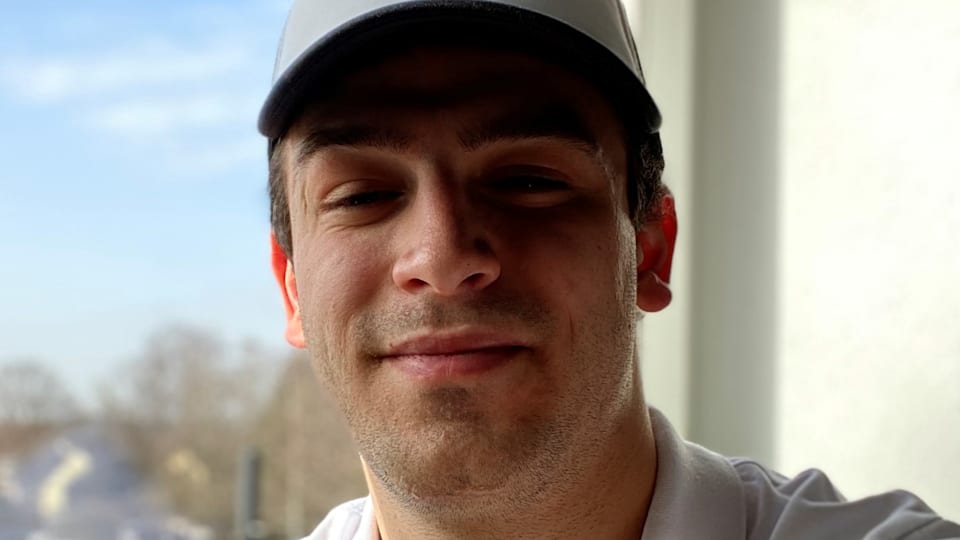Alaa Maso: The refugee athlete who sacrificed everything for sport
For Alaa Maso sport is life. After the war in Syria denied him the opportunity to continue swimming he made the impossible decision to leave in search of a safer life. Now at Tokyo 2020, his wildest dreams are being realised.

The tranquil of the pool.
It’s a place of serenity; of escape.
For Syrian refugee Alaa Maso, the feeling of carving up the water with his strokes as he swims through the pool is unlike anything else.
It’s a reminder of family; a connection to a father who coached and supported him from the poolside.
It is also what ultimately drove him and his older brother to abandon their family and home in war-torn Syria.
When the swimming training facilities crumbled away under the force of the war, the intensity of the conflict became too much. The brothers made the impossible decision to leave their home in Aleppo.
It was a journey not unlike an odyssey in its scope and ambition. Maso travelled from Syria to Turkey, before undertaking the perilous boat journey from Turkey into Greece. Then he trekked through some seven other countries before eventually finding refuge in Hanover, Germany where he now resides.
“A refugee is a survivor,” says 21-year-old Maso, sharing his experiences in conversation with Olympics.com and Luol Deng.
“Taking the choice of leaving country of origin behind and fleeing to a better or safer land is of course, a great choice to make. All refugees have been through a lot.”
Learning how to cope with the emotional load of everything he has been through has been one of Maso’s great learnings since leaving Syria.
For the swimmer, there is no greater way to overcome the suffering he has endured than channelling his energy through sport.
“Having something [like] sport will always keep you busy from thinking about your past.”
Speaking passionately about how swimming helps him, Maso explains how sport has the capacity to not only empower but to give someone the tools they need to navigate life.
“If we look at the similarities between sport and life, in both you’re always going to have obstacles. In both you’re going to face struggles. In both there are ups and downs.”
“Being an athlete will always teach you that being patient and working hard and believing in yourself is eventually going to lead you to your destination, it will get you there. So, no matter how hard the path is going to be looking like, eventually you’re going to reach it.”
“Sport has always been there for me, and I can never imagine my life without sport” - Alaa Maso
Life in the swimming lanes can be hard, and at times lonely. Connecting with others to build a strong network through sport has been something of a lifeline for Maso who trains eight times a week.
Talking about what it has taken to get to the Games, he makes no mistake when he says:
“All of time. I’ve spent a lot of time in the water, in the gym… but eventually we did it.”
“I really never imagined reaching this without the people around me who keep motivating me for example, my big brother and my family. My father who has always supported me, my mother, my sister. My friends, my teammates they’re always around and I won’t forget the first day when I had my nomination… the whole love I got from people around me I really felt the positive energy from everybody.”
Drawing on their force of those surrounding him the swimmer is he sure that he is a better athlete and person for it:
“Surrounding yourself with positive people and a group, the teammates also represent the family in life. The closer you are and the better you understand the people around you and the more positive they are to you the better person you’re going to be in your own life.”
Blood, sweat, tears and water.
Maso has poured every inch of his being into achieving his dream of swimming at the Olympic Games.
Touching the wall in Tokyo will be a great moment for Maso: “it would mean the payoff for my work. It would mean the satisfaction after the hard times.”
Is it even possible now to imagine what refugee athletes like Maso will leave behind them when the dust settles, and they return from the Games as heroes?
It’s already something that is on Maso’s mind.
At just 21-years-old, the Syrian swimmer has already endured so much; his life is one rich with experience. The lessons he has learnt is something one day he hopes to impart on those much younger than him:
“One day I would also love to have my own group, my own ‘children’ – like the people I’m going to train – I’m going to call them also my children - and teach them my skills, the things I learnt and experience over the years.”
“I’d like to pass over my legacy – let’s call it. For sure, that’s something I would like to do.”
First and foremost though, Maso must complete his Olympic quest:
“My goal for the Olympic Games will be to represent the refugees the best way I can. To swim the best way I can, the fastest way I can.”
